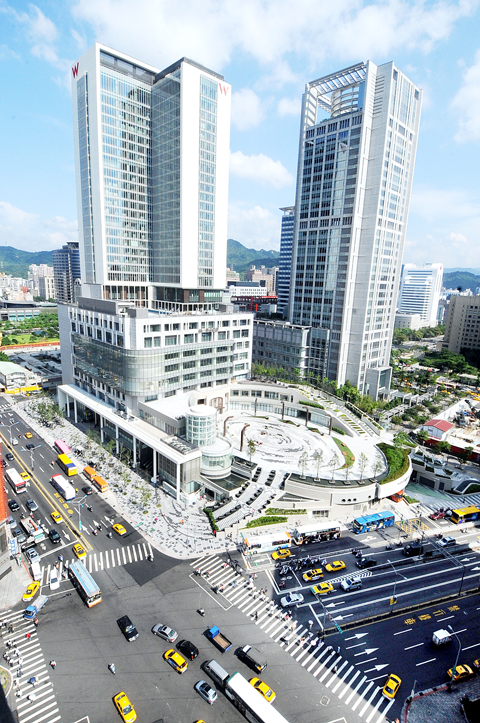Taipei City Hall Bus Station, the major transit hub between Taipei and northern and central Taiwan, opened to the public yesterday, with traffic jams in surrounding areas expected to intensify as a result.
More than 1,700 buses from 14 bus companies will travel daily in and out of the station, which is located at the intersection of Keelung Road and Zhongxiao E Road, and is expected to see about 10,000 people pass through every day between Taipei and Keelung, Yilan, Taoyuan, Hsinchu, Miaoli and Taichung.
Although the Traffic Police Division dispatched more than 140 traffic police to control traffic around the station, Keelung Road and Zhongxiao E Road Sec 5 — which are traditionally crowded during rush hour — still experienced heavier traffic jams.

PHOTO: FANG PIN-CHAO, TAIPEI TIMES
Speaking at the opening ceremony, Taipei Mayor Hau Lung-bin (郝龍斌) called on the public to be patient during the “transition period,” adding that the station was expected to boost businesses in Xinyi District (信義).
“We will use the successful model used at Taipei Bus Station in west Taipei. Taipei City Hall Bus Station, along with the shopping mall above, will bring more people and business opportunities to the Xinyi area,” he said.
The bus station was a build-operate-transfer project under the city government. Its terminals and waiting area occupy about 2,400 ping (7,934m²) of the 43,000 ping building.
The 31-story building, built by Uni-President Group, also features a shopping mall and a hotel.
The Uni-President Hankyu Department Store — a joint venture between Taiwan’s and Japan’s Hankyu Hanshin Department Stores — will open in October.
Democratic Progressive Party Taipei City Councilor Hsu Shu-hua yesterday blamed the traffic congestion on the small space at the bus station and accused the city government of favoring private enterprises by giving up most of the space to contractors for the shopping mall.
“The traffic will only get worse when the shopping mall opens and attracts large crowds,” she said.
Passengers also complained about a lack of seats in the waiting area, urging the city government to improve the situation.
“It’s hard to believe there are only two rows of seats at the bus station. Most people are forced to stand around with their luggage. The city government should not have made such a mistake,” said Huang Ai-ju (黃愛如), a Taipei resident waiting for a bus to Yilan.
Luo Shiaw-shyan (羅孝賢), commissioner of the city’s Department of Transportation, said the waiting area had 77 seats, adding that this was sufficient because most bus routes served short-distance commutes, which required short waiting periods for passengers.
He dismissed concerns that the seating area was purposely designed to be small to provide more room for the shopping areas. He said the department could always add more seats if needed.

Alain Robert, known as the "French Spider-Man," praised Alex Honnold as exceptionally well-prepared after the US climber completed a free solo ascent of Taipei 101 yesterday. Robert said Honnold's ascent of the 508m-tall skyscraper in just more than one-and-a-half hours without using safety ropes or equipment was a remarkable achievement. "This is my life," he said in an interview conducted in French, adding that he liked the feeling of being "on the edge of danger." The 63-year-old Frenchman climbed Taipei 101 using ropes in December 2004, taking about four hours to reach the top. On a one-to-10 scale of difficulty, Robert said Taipei 101

Nipah virus infection is to be officially listed as a category 5 notifiable infectious disease in Taiwan in March, while clinical treatment guidelines are being formulated, the Centers for Disease Control (CDC) said yesterday. With Nipah infections being reported in other countries and considering its relatively high fatality rate, the centers on Jan. 16 announced that it would be listed as a notifiable infectious disease to bolster the nation’s systematic early warning system and increase public awareness, the CDC said. Bangladesh reported four fatal cases last year in separate districts, with three linked to raw date palm sap consumption, CDC Epidemic Intelligence

Two Taiwanese prosecutors were questioned by Chinese security personnel at their hotel during a trip to China’s Henan Province this month, the Mainland Affairs Council (MAC) said yesterday. The officers had personal information on the prosecutors, including “when they were assigned to their posts, their work locations and job titles,” MAC Deputy Minister and spokesman Liang Wen-chieh (梁文傑) said. On top of asking about their agencies and positions, the officers also questioned the prosecutors about the Cross-Strait Joint Crime-Fighting and Judicial Mutual Assistance Agreement, a pact that serves as the framework for Taiwan-China cooperation on combating crime and providing judicial assistance, Liang

US climber Alex Honnold left Taiwan this morning a day after completing a free-solo ascent of Taipei 101, a feat that drew cheers from onlookers and gained widespread international attention. Honnold yesterday scaled the 101-story skyscraper without a rope or safety harness. The climb — the highest urban free-solo ascent ever attempted — took just more than 90 minutes and was streamed live on Netflix. It was covered by major international news outlets including CNN, the New York Times, the Guardian and the Wall Street Journal. As Honnold prepared to leave Taiwan today, he attracted a crowd when he and his wife, Sanni,